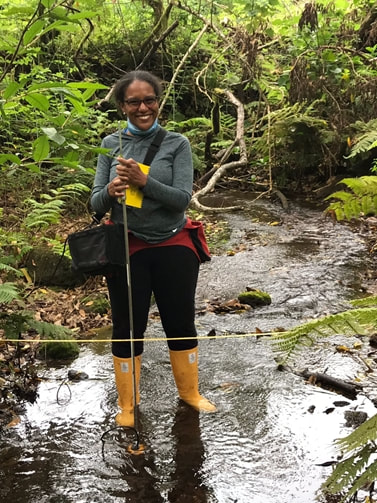What does ecohydrology mean to you?
Ecohydrology focuses on understanding how ecological and hydrological processes are connected, what mechanisms are involved, and the feedbacks associated with them at different spatial and temporal scales.
What are your undergraduate and graduate degrees in?
I completed two professional degrees simultaneously in Colombia: sanitary engineering and computer science engineering. As an undergrad, I was seeking to combine both disciplines when I discovered hydrology and how modelling and software development are integrated as a tool to represent hydrologic processes. Then I did a master’s in environmental engineering where I combined hydrological modelling and spatial database design. Now I am a PhD student in Geography where I also have the opportunity to listen more carefully and discover strategies to integrate ecohydrology to social processes which I believe is a complex area that I would like to explore during my career.
How did you arrive at working in/thinking about ecohydrology?
I started thinking questions related to water-land cover interactions at the final stage of my master’s thesis. My research was conducted in a tropical rural and remote region where rapid land use and land cover changes were occurring due to intensification in agricultural and mining practices. I used hydrologic conceptual model’s approach to understand the groundwater recharge of a shallow aquifer. However, lack of data on land use change made it challenging to conceptualize and represent those changes in the model. Later, working on consulting projects in hydrology, I experienced the limitations that neglecting land cover and land use dynamics can cause in the decision-making processes in both, land and water management. Then, I decided I wanted to contribute to reducing these limitations during my PhD, and I found ecohydrology as an integrated discipline. Currently, I am studying the impacts vegetation change due to agricultural practices produce in the hydrologic cycle in tropical settings.
What do you see as an important emerging area of ecohydrology?
Understanding the water and energy cycles under scenarios of change: This includes addressing data integration among remote sensing, ground observations as well as combining historical data describing ecosystems and hydrologic processes in different geographic, ecological and hydrological settings.
Do you have a favorite ecohydrology paper? Describe/explain.
Asbjornsen, H., Goldsmith, G. R., Alvarado-Barrientos, M. S., Rebel, K., Van Osch, F. P., Rietkerk, M., Chen, J., Gotsch, S., Tobon, C., Geissert, D. R., Gomez-Tagle, A., Vache, K., Dawson, T. E. (2011). Ecohydrological advances and applications in plant-water relations research: a review. Journal of Plant Ecology, 4(1–2), 3–22. They present a broad spectrum of the challenges and advances of the discipline. It is a good reference paper to understand how the field has evolved and what are perspectives guiding data collection and data analysis as well as modelling techniques.
What do you do for fun (apart from ecohydrology)?
I enjoy dancing folklore especially from Colombia because it is the one I have more experience with, but I also enjoy learning about music, dance movements and traditions all over the world. Besides dancing, I hike and love going to forested and rural areas.

 RSS Feed
RSS Feed